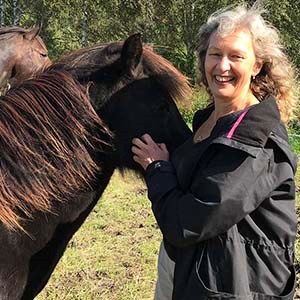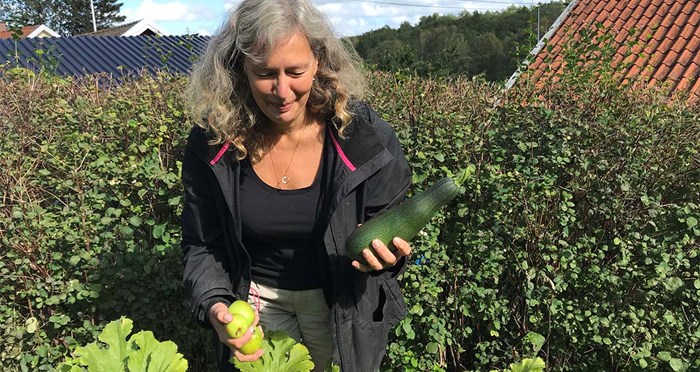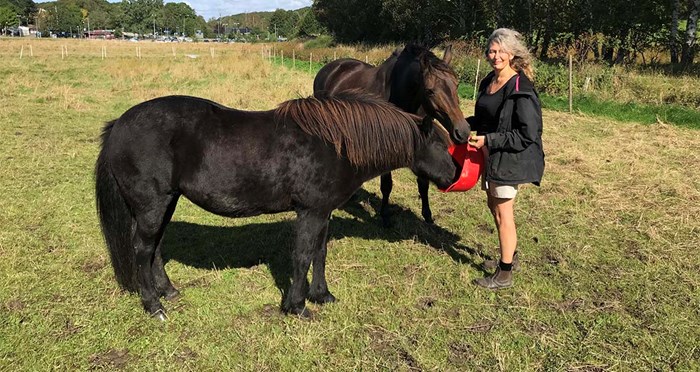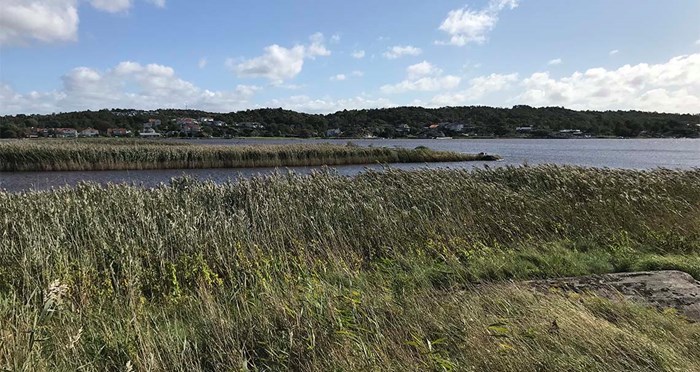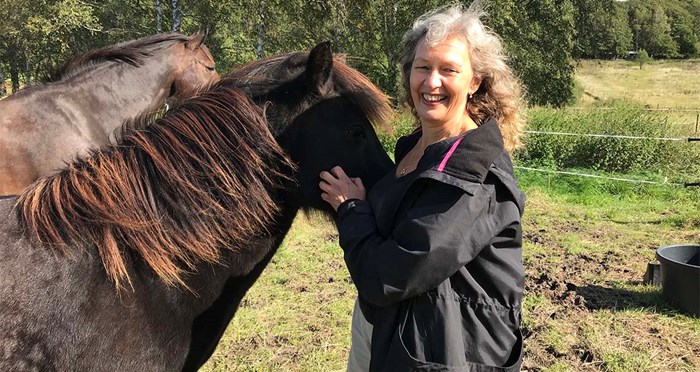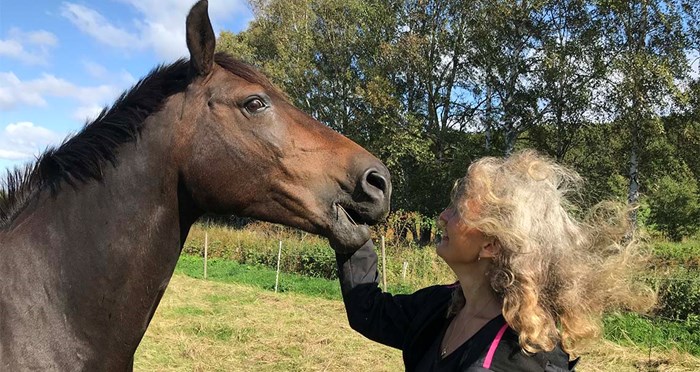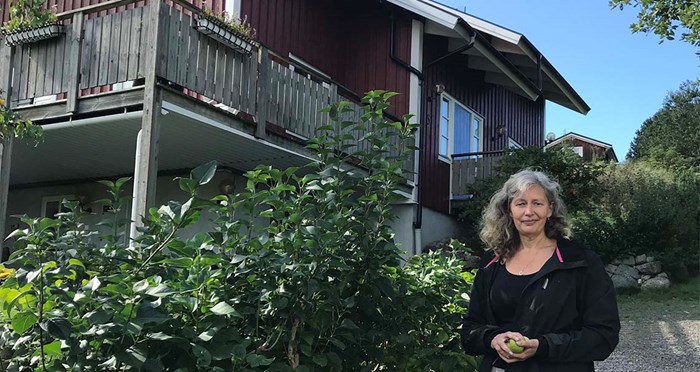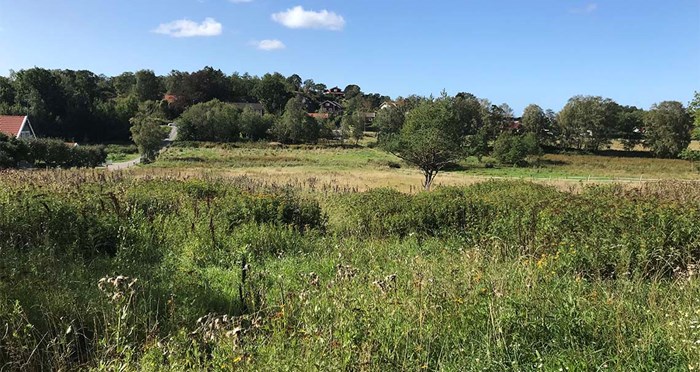“Hello, I’m Mia. Come on in!”
A pair of steady, blue-green eyes meet my gaze. Mia, that’s what everyone calls her, has wavy steel-grey hair and is casually dressed in shorts. She verifies that the city is moving closer and closer. At the end of the 1980s, when Mia and her husband Magnus’ house was being built, this area was just countryside, but is now dotted with more and more houses.
“So far, my husband’s family still owns their grounds – we use it for the horses.”
This is where we get engrossed in discussing life with children; Mia and Magnus have two grown sons and a daughter. She splits her life between two worlds – the urban and the rural – as well as her career. As we talk, the ginger cat Tesla strolls up to Mia and decides that, since Mia is sitting still, she has time to scratch him.
“When the children were small, Magnus and I shared the responsibilities, just like other parents from our generation. We both worked full-time, were committed to the children’s Montessori school and coached their various teams. We also had horses and cats, but still managed to make it possible for me to finish my dissertation. We were constantly making it work.”
Her dissertation, the Microstructure of Hot Isostatically Pressed Si3N4-ceramics, paved the way for a continued career at Chalmers. Mia knows a lot about steel, structures, aluminium, microwaves and electronic scrap recycling. She has a Master of Science in Engineering and is a professor with a solid CV, not least in regard to her knowledge about education. She has received awards for her pedagogical skills, worked with several university evaluations and was the Vice President of Education and Lifelong Learning for seven years.
“In such contexts, it’s not unusual to be made aware of new opportunities, and that’s where SLU came in,” states Mia.
A national university
“I have worked a lot in a matrix organisation to find joint objectives. Objectively, it’s not difficult to see clear goals for SLU that focus on our living natural resources. However, it is a challenge to lead an organisation that is spread over the country like we are. Cohesion is very important.
“The fact that the university has sites all over the country is a double-edged sword; it’s a big advantage to be available everywhere,” says Mia and coins the motto: ‘the university is never far away’. “However, it is also important to create joint procedures that make work efficient. Where is it best to do things in the same way, and where is it best to adapt to local conditions?”
Mia believes that SLU is nationally important, and in order to form an idea of the university throughout the country, she has begun her mission to see as much of SLU’s Swedish operations as possible. Since our university can be found from the south to the north, she has her work cut out for her. However, most Mondays start in Uppsala. And, it’s also possible to travel digitally.
“It’s cool that digital meetings work so well at SLU,” says Mia, and goes back to discussing our visions and strategies, as well as the fact that we need to talk about how we can make SLU a an even better Swedish university, where the different sites in some way or another can act as representatives for the whole university. Another important challenge is increasing diversity.
“If you look at us from the outside, we are one big university, and our communication must relate to the whole of SLU. We can be found all over Sweden, and together, we can take responsibility and showcase this. But, things are only going to be as good as we make them.
“Another concern is the recruitment for some of our programmes,” states Mia, who has experience of declining interest in young people when it comes to for example maritime education.
“However, from what I’ve seen at SLU so far, it’s been wise to not just change marketing tactics, but also seriously work with changing and developing our courses and programmes, in order to make them attractive to both applicants and the labour market. In regard to both maritime and land-based sector professions, the businesses in question get involved in the recruitment process, which is very important.”
Leadership
Mia is both experienced and interested in leadership, and has a strategy for the future. This involves using our forums to identify and ensure that everyone can contribute in their roles. She wants to gather SLU’s heads of department to find out what they want to do. She also states that it can be difficult to be a head of department and leader, and that it is important to discuss managerial roles.
“We need good collegiality and should meet in our roles as line managers, create joint objectives and implement them.”
When we touch on the subject of reorganisation, Mia’s tone sharpens.
“That’s a difficult word. When management discusses a reorganisation for a long time, it is usually far away from being accepted and implemented in the organisation, and management thusly risks moving to the next step too early. Reorganisation requires plenty of leadership, perseverance and not causing unnecessary worry for the staff. It’s easier to let go of foundations and dare to make changes if there’s a basic sense of security.”
The view of SLU
Mia’s personal view of SLU primarily comes from friends, fellow horse lovers and Chalmers colleagues.
“I’m not an expert in all of SLU’s areas of expertise, but I’m not presumptuous and think I’m very respectful, and I know I need to listen.”
We discuss the future, and in ten years, Mia sees SLU as wellknown everywhere.
“Those of us working within agriculture know. In ten years, the public will also know how relevant we are, and that SLU can always be found close by, regardless of social group. We are a fact-based university that dares to face complex issues, and we will continue to have high scientific competence; if you ask us something, you will get an answer. Universities are ranked annually, and in ten years, SLU will not only be at the top of research rankings, but we will also have increased strongly in SIFO’s estimation index, which ranks who the public trusts the most.
“We also collaborate well with various branch of industries, trades or agencies we are connected to, and we have good connections with other universities – we can achieve all of the aforementioned by helping each other, using our respective roles. We also need to have respect for the perspective of time, and work for long-term, research-based, close collaboration. We must prepare for the professional roles that may exist in the future,” states Mia, who recently took part in a successful inauguration ceremony.
“The robe and chain of office are attributes that show that academic work is different than other jobs. I respect that, but I’m still an ordinary girl from Biskopsgården. My contribution to SLU will be in the spirit of ‘leading myself and others’ – I’ll do what I can, and together, we will make it fantastic!” she concludes.
